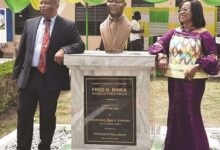I cannot believe that in just about a year from now (in May 2023) we shall be celebrating the 60th anniversary of what used to be called the ‘Organisation of African Unity’ (OAU, which is now called the African Union (AU).
How did a group of countries with varying experiences of colonial rule, manage to close their eyes to cover their differences – political, economic and social – and come together in one organisation with a common purpose?
Well, it wasn’t easy. The year 1963, in which the OAU was formed, was an exciting one in Ghana. Some of us in the journalistic profession, watching the scene from Accra, realised that it was a “make or break” year for the continent. Ghana’s first president, Dr Kwame Nkrumah, was in a hurry to implement his idea of forming a single continental government in Africa. His determination stemmed from both personal and political motivations.
To take the personal motivations first: in August 1962, he had been extremely lucky to survive a grenade attack carried out against him at Kulungugu, in northern Ghana, by members of the country’s opposition, the United Party, who had fled to neighbouring countries like Togo and Upper Volta (now Burkina Faso) to avoid being detained without trial under the Preventive Detention act.
Nkrumah ‘s security services, however, laid the attack at the door of members of his own Convention People’s Parry, whose general secretary, Tawia Adamafio, and other members of the party’s secretariat were subsequently arrested and charged with organising the attack.
Ironically, Tawia Adamafio was one of the few people Nkrumah had felt he could rely upon in his party, and the fact that the security services produced evidence that seemed to blame Adamafio and his “fellow conspirators” [including Foreign Minister Ako Adjei and the CPP Executive Secretary H. Cofie-Crabbe] for the grenade attack, was a cataclysmic event that frightened Nkrumah considerably.
He realised that he might be surrounded by traitors and that he might not have too long to live. Therefore, if his biggest dream – – e creation of an African continental government – was to be achieved in his lifetime, there was no time to lose. (It was later discovered that some of the evidence against Adamafio & co must have been manufactured!)
The alleged conspiracy forced Nkrumah’s hand, for the astute politician that he was, he knew that if continental unity was achieved in Africa, he, as its principal architect, would emerge as the hero of Africa and this glory would bounce back to Ghana and strengthen his position tremendously.
But many other African leaders either had their own vision of the role they wanted their countries to play in Africa and the world (and were not about to jettison this and accept someone else’s!) or else felt threatened by Nkrumah’s continental politics, especially their relationships with their former colonisers.
Many of these leaders had, in fact, been eased into power in their countries by the former colonial powers, who continued to wield a great deal of influence over them. These masters were extremely suspicious of Nkrumah, whom they regarded as a communist fellow-traveller at worst, and at best, an upstart who wanted to pry their former colonies away from them.
The French, in particular, had painstakingly cultivated very cosy relations with their former colonies, based on flattery and bribery. Where that did not work, they were not above resorting to assassinations or coups d’etat to remove African leaders they did not fully trust. The man in charge of schemes that fostered French neo-imperialism, Jacques Foccart, has become a legendary figure whose name spelt death to many regimes. They were said to have been “foccared”!
The following quote from a website that, with tongue in cheek, propounds what it calls “useless knowledge”, reveals the French position clearly:
“The French are masters of dirty tricks in Africa. From the 1960s on, France’s relations with Africa were handled by a semi-secret cell within the president’s office charged with maintaining a financial and military zone of influence, stretching from Morocco to Madagascar. Under Jacques Foccart, French ‘cooperation’ officials virtually ran many African governments. In a confessional book, Foccart acknowledged that African leaders gave French ambassadors signed requests for military intervention, leaving [the] dates blank! … It is most fortunate that Africa has a long history of [having] a short memory of hate.”
Among Franco-African politicians who fell victim to Jacques Foccart’s plots was Felix Moumie of Cameroon (poisoned in Switzerland). Overtly, French ruthlessness against those who did not dance to France’s tune, was exemplified against Guinea in 1958, when the Guineans voted “Non” to the French option, in a referendum organised by President Charles de Gaulle. The referendum was ostensibly designed to give a chance to the French colonies in Africa to choose between acquiring independence, or staying as members of a newly-framed module of association called “The French Community”, which was crafted and overseen by the aforementioned Jacques Foccart.
This “French Community” was partly based on the concept of the “British Commonwealth”, through which the British had managed to preserve loose ties with all their former colonies that had gained independence (with the exception of Burma and Sudan).
When Guinea voted “Non”, the French left the country in a huff, taking everything they could carry back to France! Vital equipment needed to administer the country were taken away, including typewriters! Telephones were torn from their wall sockets and shipped off to France! Of course, they left nothing in Guinea’s treasury.
Dr Kwame Nkrumah was incensed when he heard about this. He had been ceaselessly telling Ghanaians that the treachery of imperialism knew no bounds. What had just happened to Guinea proved that he had been right all along. For if the French did not really want the people of Guinea to express their true opinion on whether to stay within the French Community or not, then why had they gone to the trouble and expense of organising an elaborate referendum? Hypocritical imperialist “pretence” – what else?
Nkrumah wasted no time in taking the opportunity to demonstrate that with unity, Africa could solve most of its own problems. Most Ghanaians had hardly ever heard of the Guinean president, Ahmed Sekou Toure – until Dr Nkrumah invited him to Accra.
And although Ghana was not too wealthy itself (it had then begun to sound out the rich Western countries for aid to finance its Volta Dam project at Akosombo), Nkrumah immediately offered Sekou Toure a “loan” of ten million pounds sterling (worth at least $200M in today’s money). With that, Guinea would be able to survive for the time being, Nkrumah reasoned.
This act of selflessness was received with astonishment throughout Africa. Never before had an African country been seen to make such a great sacrifice for another. In colonial times, Africans from different places often only met each other when soldiers from one country were sent to quell riots in another, as happened during the riots that occurred in the Gold Coast (Ghana) in 1948, when soldiers from Nigeria were brought here, to “teach the rioters some sense”.
TO BE CONTINUED
By Cameron Duodu




